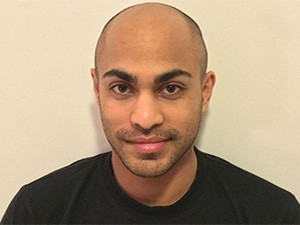Azhar Desai from Thinkst describes his entry into the world of technology, as being pretty much through the front door. "Retrospectively, I mark that crossing over from outside the interface into the program code with my first encounter as a kid with an introductory programming book. Thanks to a cousin, that book was 'The Complete Idiot's Guide to Visual Basic 3'."
He says for all its faults, it was a wonderfully friendly introduction to the unforgiving strictness with which computers munch their program code. "It pleases me immensely to see that that friendly tradition is still around in books like 'Why's (Poignant) Guide to Ruby' and 'Learn You a Haskell for Great Good'."
Speaking of his education, he says his undergraduate degree at UCT up to honours level was split between between computer science and math. "Towards the end, my focus narrowed and afterwards I did brief stint at the CSIR followed by a master's degree at a Grande 'Ecole in France, all sharply focused on computer security. Over the past two years I've been at Thinkst doing a great mix of building software, applied research and speaking at conferences."
On his decision to become involved in the IT security arena, he says it was application security that drew him in. "The exactness it required had the most appeal: a single errant byte or a number off-by-one can be the start of the unravelling of some system not just to break, but to break unexpectedly in way advantageous to someone else."
Much, much later Desai came across a superb articulation of this exactness by researchers exploring why it's difficult to constrain certain systems' inputs to a safe set. "The system is viewed as a machine operating on given input. They referred to manipulating the unexpected behaviours of the machine, outside of how it should work, as programming the weird machine."
There are many things he enjoys about his job: "With the work we do, there's great space to talk about and test out nascent tech ideas. As an example, the quarterly computer security research surveys we put out, is useful look at which directions the security community is pursuing. As for our research, it's good to see some ideas grow up into product features or into conference talks, and have them tested by a wider audience."

In terms of developments in SA's tech sector stand out the most, he says a few organisations cropped up in recent years to train people in SA to be software developers. "The aim of these vary from paid-for courses to poverty alleviation. It will be useful to see how these fare."
Is there anything Desai would have done differently? "Looking back, it would be better to be bolder. The wizardry that people display in areas of tech, while awe-inspiring to watch, can intimidate the newcomer. Before I'd ever written any, C programs seemed to be the domain of demi-gods. It would have been good to add more, and be less timid, to be bolder and persistent when it came to confusing and unfamiliar topics, as that goes a long way."
Similarly, he said he would have added more boldness in reaching out to people, including strangers, for advice. "Now having been on both sides, it's easier to see that people are often quite happy to be helpful."
It's satisfying being pushed to realise projects and being in conversation with others on the evolution of tech, he concludes.
Share